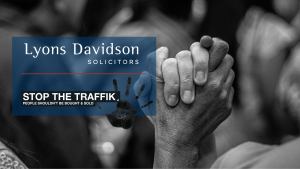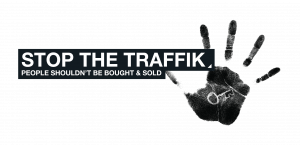
In July, Sir Mo Farah shared his story as a victim of human trafficking. He was trafficked to the UK as a child for the purpose of domestic servitude – this is where the person is forced to work as a servant in a private home.
In response, STOP THE TRAFFIK shared a public thank you to him a few days later:
“Thank you for the courage to share your story.
You told us “I’m not who you think I am”
…
And now you have shared another race you have been running, alone: a route that started in Somaliland and brought you to the UK. You have now found the extraordinary courage to share the truth that you were trafficked.
…
We remain committed and hope to respond with a fraction of such courage to fight to disrupt this global crime and to share what we know. Every time the light of transparency shines on this crime we take a step.
History will hold us to account for the race we run.
Thank you,
STOP THE TRAFFIK Group”
Having now gathered our thoughts further, Lyons Davidson and STOP THE TRAFFIK feel it’s important that we discuss what Sir Mo Farah’s story highlights: that modern slavery and human trafficking is still prevalent across the globe; that anybody could be a victim, a neighbour, a friend, a family member, a colleague; and that there is so much more to be done by individuals and businesses to prevent this crime.
Human trafficking is the movement or recruitment of people by deception or coercion for the purpose of exploitation; it often goes hand in hand with modern slavery, which is the illegal exploitation of people for personal or commercial gain. The type of exploitation that occurs within a country or region can take many forms: in the victim’s home country, during migration or in a foreign country; through forced labour, sexual exploitation, debt bondage, domestic servitude; on construction sites, hotels, fast food chains, offices, cleaning companies – just to name a few.
Traffickers target people by exploiting their vulnerabilities and often taking away the control they have over their own life. But what makes someone vulnerable to trafficking and modern slavery varies depending on the person’s individual situation. Some major factors that can increase a person’s vulnerabilities to human trafficking and modern slavery are:
- Family situation
- Geopolitical situation of the source, transit or destination country, including conflict or political instability
- Poverty
- Refugee
- Legal right to work in the country
- Health, including mental health and addictions
- Gender inequality
So which person do you think would be easier to exploit?
- Woman A lives in a war-torn country without any family and flees to a politically instable country where she doesn’t speak the language and has no family ties
- Woman B lives in a stable, democratic country with her husband and 3 children under the age of 10 and speaks the language of that country but neither her nor her husband have a job
Woman A has more vulnerabilities than Woman B, making it easier for a trafficker to exploit Woman A. That doesn’t mean though that Woman B isn’t vulnerable to trafficking as her and her husband need to support their three children and a trafficker could exploit this need.
Because of the variety of vulnerabilities that could be exploited, modern slavery and human trafficking occurs in every country across the globe. According to the ILO, there are 40.3 million trafficking and exploitation victims worldwide. Of those 40.3 million, there are currently 16 million adults forced into labour in the private economy globally.
In the UK alone, the Home Office has reported that roughly 12,727 people were identified as potential victims of modern slavery and human trafficking in 2021. Which is why the most common form of exploitation in the UK for adults is labour exploitation. STOP THE TRAFFIK have found that UK nationals are actually the most exploited nationality in the UK. These figures show that whilst it is often assumed that certain nationalities are at high risk of exploitation, anyone in any country of any nationality could become vulnerable to trafficking and exploitation.
It is a crime often hidden in plain sight and can be very difficult to spot the signs if you are not aware of them. The signs can vary depending on the type of exploitation, but not knowing the signs can leave your business open to the risks of modern slavery and human trafficking – whether that be within your own employees, customers or supply chains. It is, therefore, crucial that individuals and businesses know how to spot the signs of human trafficking, how to report it if they have suspicions and what to do to mitigate their own modern slavery and human trafficking risk.
This is why Lyons Davidson have been working with STOP THE TRAFFIK who have developed a modern slavery awareness raising training for Lyons Davidson’s staff to complete. The training defines modern slavery, looks at the intelligence picture across the UK and then assesses how modern slavery and human trafficking can impact Lyons Davidson’s supply chain to ensure their staff are aware of the risks it poses to the business. We will also be working together to conduct a high-level risk mapping of Lyons Davidson’s supply chain to identify their high-risk sectors and suppliers.
What Sir Mo Farah’s story shows us is that it’s our collective responsibility to better protect our society by understanding, mitigating and preventing modern slavery and human trafficking both at home and afar.
For more information about STOP THE TRAFFIK please visit STOP THE TRAFFIK | People shouldn’t be bought and sold




